外研版英语八年级上册 Module 5 Unit 1I wanted to see the Beijing Opera.课件(34张PPT)
文档属性
| 名称 | 外研版英语八年级上册 Module 5 Unit 1I wanted to see the Beijing Opera.课件(34张PPT) | 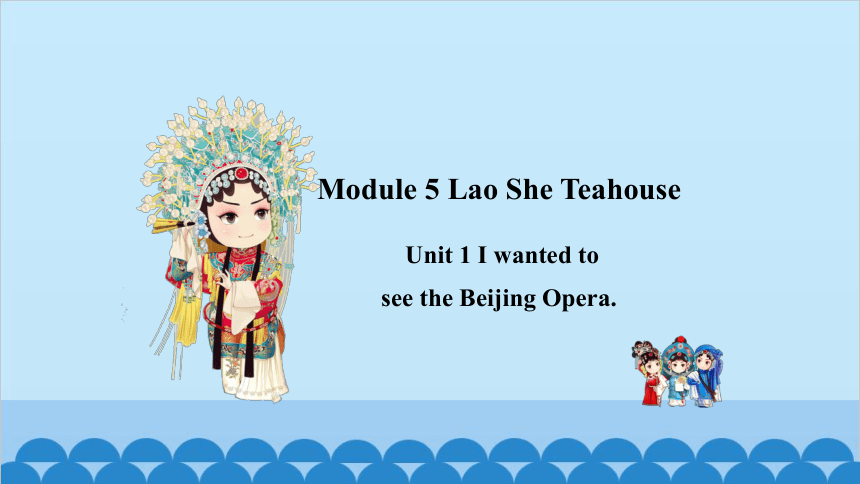 | |
| 格式 | pptx | ||
| 文件大小 | 18.3MB | ||
| 资源类型 | 教案 | ||
| 版本资源 | 外研版 | ||
| 科目 | 英语 | ||
| 更新时间 | 2023-08-10 15:15:42 | ||
图片预览

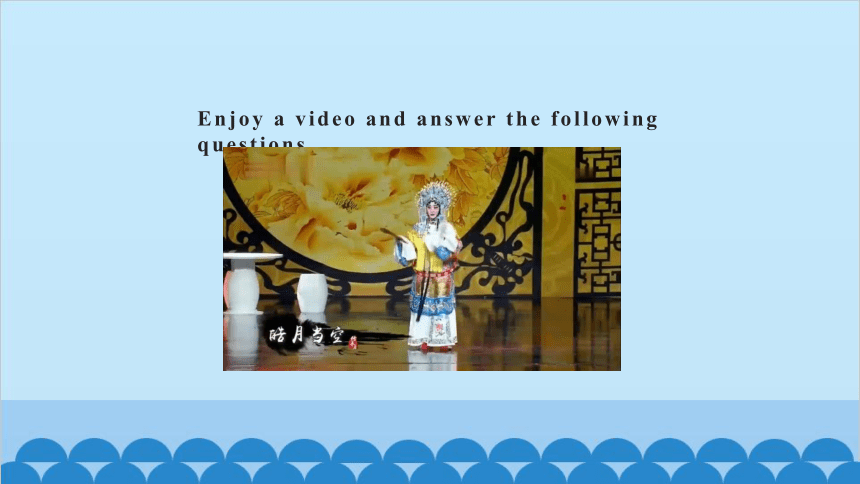


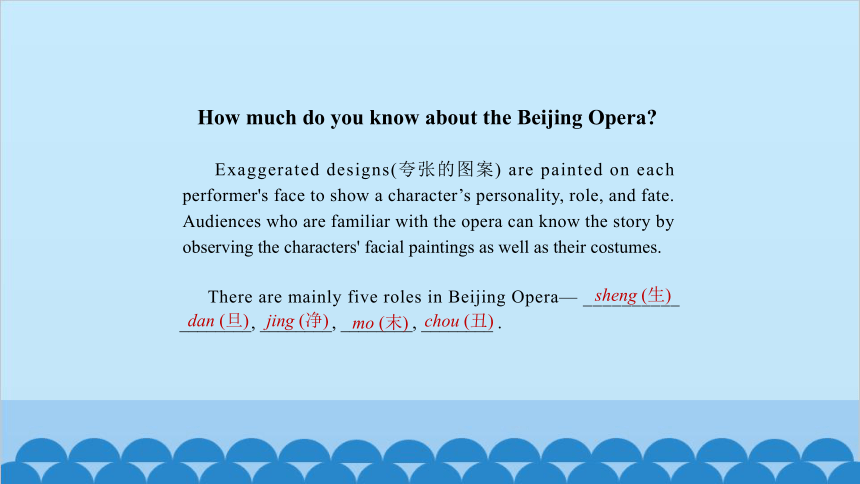
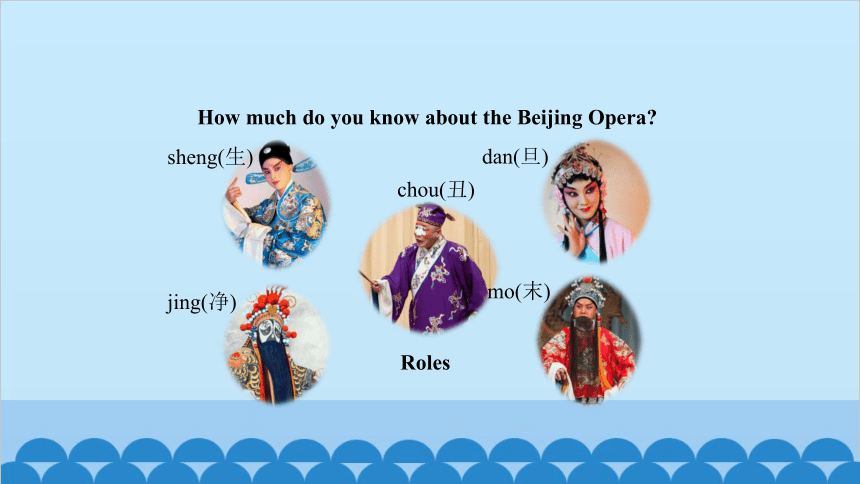

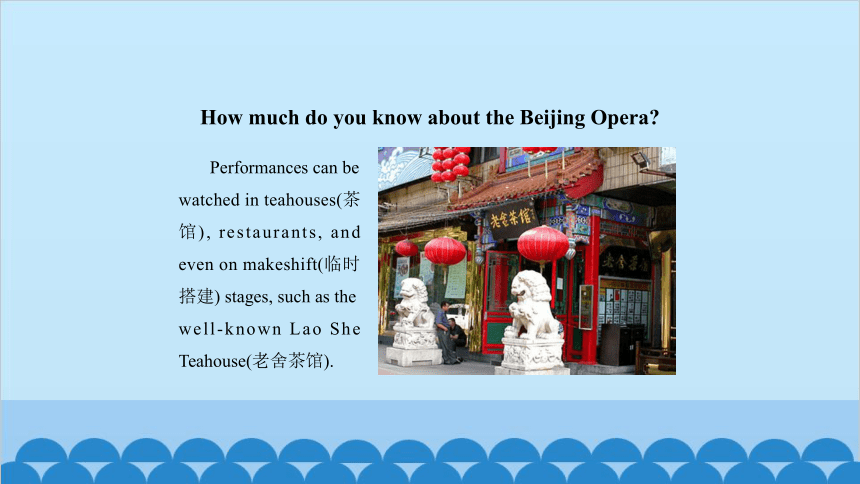
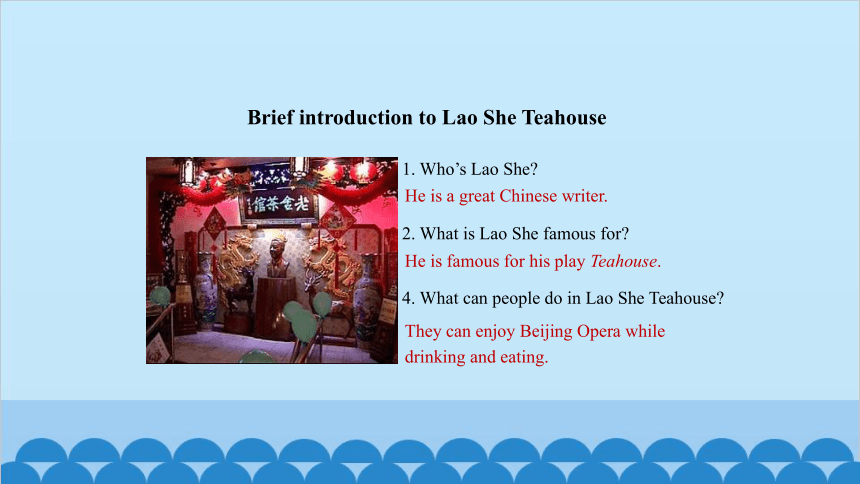

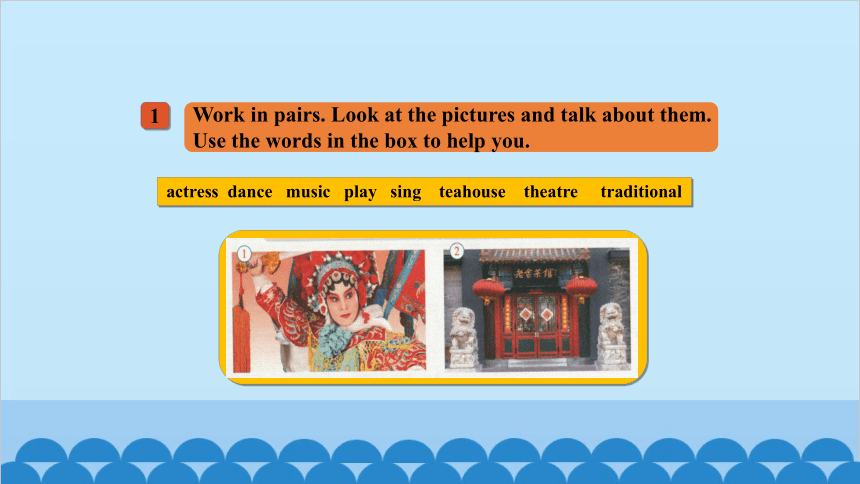
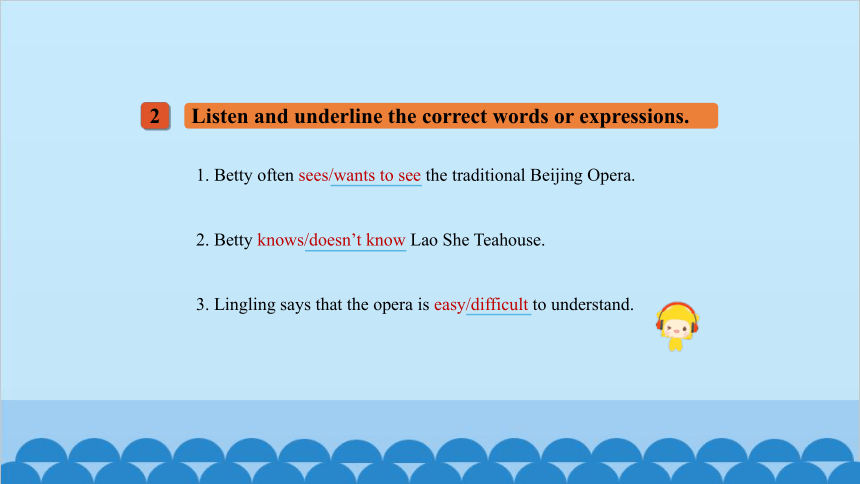
文档简介
(共34张PPT)
Module 5 Lao She Teahouse
Unit 1 I wanted to
see the Beijing Opera.
Enjoy a video and answer the following questions.
Enjoy a video and answer the following questions.
What is the name of this music
The Drunken Beauty(《贵妃醉酒》).
What traditional art(传统艺术) of China is displayed
Beijing Opera.
What is the actress(女主角) called in this traditional art
Dan(旦).
How much do you know about the Beijing Opera
Beijing opera is one of the oldest art forms in the world. Since the Tang Dynasty, performers of Beijing Opera have been called “theatrical performers(梨园弟子)”. During the Qing Dynasty, it became popular among ordinary people.
Exaggerated designs(夸张的图案) are painted on each performer's face to show a character’s personality, role, and fate. Audiences who are familiar with the opera can know the story by observing the characters' facial paintings as well as their costumes.
How much do you know about the Beijing Opera
There are mainly five roles in Beijing Opera— __________ ________, ________, ________, ________ .
sheng (生)
dan (旦)
jing (净)
mo (末)
chou (丑)
jing(净)
sheng(生)
dan(旦)
chou(丑)
mo(末)
Roles
How much do you know about the Beijing Opera
How much do you know about the Beijing Opera
How much do you know about the Beijing Opera
Performances can be watched in teahouses(茶馆), restaurants, and even on makeshift(临时搭建) stages, such as the well-known Lao She Teahouse(老舍茶馆).
Brief introduction to Lao She Teahouse
1. Who’s Lao She
2. What is Lao She famous for
4. What can people do in Lao She Teahouse
He is a great Chinese writer.
He is famous for his play Teahouse.
They can enjoy Beijing Opera while drinking and eating.
actress
teahouse
offer
end
in the end
no idea
n. 女演员
n. (尤指亚洲的) 茶馆
v. 提议;提出
n. (时间的)最后一段,末尾
v. 结束
最后;终于
不知道
New words and expressions
actress dance music play sing teahouse theatre traditional
1
Work in pairs. Look at the pictures and talk about them.
Use the words in the box to help you.
1. Betty often sees/wants to see the traditional Beijing Opera.
2. Betty knows/doesn’t know Lao She Teahouse.
3. Lingling says that the opera is easy/difficult to understand.
2
Listen and underline the correct words or expressions.
Lingling: Hi, Betty.
Betty: Hi, Lingling. I’d like to see the traditional Beijing Opera.
Lingling: Do you want to come to Lao She Teahouse with me
Betty: What’s Lao She Teahouse
Lingling: You can listen to the Beijing Opera there and drink tea at the same
time.
Betty: Yes, please. I’d like to go with you. You can tell me what’s
happening.
Lingling: Yes, it’s quite difficult to understand the story! Just watch the
actors and actresses, listen to the music and try to enjoy it.
2
Tapescript:
①What did they do in the teahouse
A. They drank tea.
B. They watched an opera.
C. A and B
②How long did they stay
A. One hour.
B. Two hours
C. Three hours.
3
Listen to the passage and choose the right answers.
1. Tony went to Lao She Teahouse with Betty and Lingling. ( )
2. Betty understood the opera. ( )
3. Lingling and Betty stayed longer than they planned. ( )
4. Betty enjoyed the opera. ( )
5. Betty would like to see the Beijing Opera again. ( )
6. Betty knew about Lao She before she went to the teahouse. ( )
F
F
T
T
F
F
3
Listen again and check the sentences.
3
Read and underline the sentences with “to do”.
Betty: Lingling and I went to Lao She Teahouse last night.
Tony: How was it
Betty: It was great! You know, I wanted to see the Beijing Opera, so Lingling offered to take me
there. We drank tea and watched an opera.
Tony: Did you understand the opera
Betty: No, it was difficult to understand the words. But the actors and actresses were excellent.
Tony: How long did you stay
Betty: We only planned to watch for an hour, but in the end, we stayed for three hours.
Tony: Did you enjoy it
Betty: Well, it was interesting—that's the main thing. I hope to understand more next time.
Tony: Do you often go to see the Beijing Opera, Lingling
Lingling: No, I don't. I wanted to take Betty to the teahouse because it's famous.
Tony: Who is Lao She
Betty: No idea. Ask Lingling
Lingling: Lao She is a great writer. He‘s especially famous for his play Teahouse.
动词不定式的用法
1. 动词不定式是由不定式符号 to+动词原形构成的,分为带 to 的
不定式和省略 to 的不定式两种形式。
2. 动词不定式在句子中可用作宾语和主语。
3. 常见接供词不定式作宾语的动词(短语)有 want, agree, choose,
decide, fail, hope, plan, would like等。
“find/think/feel + it+ adj. + 动词不定式”结构中,it 为形式宾语,
动词不定式才是真正的宾语。
Betty wanted to see the Beijing Opera, so Lingling (1) _______ to take Betty to Lao She Teahouse. The words of the opera were (2) ________ to understand, but the actors and (3) _________ were excellent. They only planned to watch for an hour, but in the (4)_____, they stayed for three hours. Betty thought it was interesting — that was the (5) ______ thing!
difficult
actresses
end
main
offered
actress difficult end main offer
4
Complete the passage with the correct form of the words
in the box.
Language points
1. ... so Lingling offered to take me there.
① offer to do sth. 主动提出做某事
她提出要买一本词典。
② offer sb. sth. = offer sth. to sb. 给某人提供某物
这位老人给我提供了一个不错的房间。
She offered to buy a dictionary.
The old man offered me a nice room.
Language points
2. No, it was difficult to understand the words.
It’s + adj. (+ for sb.) + to do sth.
(对某人来说)做某事是……
对我们来说写好字很重要。
It is important for us to write well.
Language points
3. ... but in the end, we stayed for three hours.
in the end(最后;终于) 相当于 at last 或者 finally。
in the end, at last 具有较浓厚的感彩,表示经过一番努力或曲
折的过程之后才实现;而 finally 一般指一系列事物或论点的顺序,
没有感彩。
最后,他成功了。
In the end, he succeeded.
Language points
4. He’s especially famous for his play Teahouse.
be famous for 以/因为……而著名
be famous as 作为……而著名
纽约以高楼大厦而闻名。
鲁迅作为一个作家而出名。
New York is famous for tall buildings.
Lu Xun is famous as a great writer.
英语语句中的重读规则即对所强调的信息进行重读。在含有动词不定式的语句中,动词和名词往往重读,介词、连词、助动词弱读。
Pronunciation and speaking
1. —Do you want to see the Beijing Opera
— Yes, I’d love to.
2. — Do you want to come to Lao She Teahouse with me
— Yes, I’d like to go with you.
Now listen and check.
5
Read and predict which words in the answers the speaker
is likely to stress.
6
Work in pairs. Read the conversations in Activity 5 aloud.
1. I have decided to __________ next week.
2. They offered to ______________ .
3. I hope to _________________ one day.
4. My parents agreed to ___________________ on Saturday.
get up early
take me home
walk on the moon
take me to the theatre
7
Complete the sentences.
Where do you plan to go
Who do you want to go with
What do you hope to see
How long do you decide to stay
Work in pairs
Talk about your summer travel plan with these questions.
1. —How was it —It was great!
2. You know, I wanted to see the Beijing Opera, so Lingling offered to
take me there.
3. It was difficult to understand the words.
4. We only planned to watch for an hour, but in the end, we stayed for
three hours.
5. That’s the main thing.
6. I hope to understand more next time.
7. No idea.
8. He’s especially famous for his play Teahouse.
Recite these sentences. 语句诵读。
1. A/An _____ can use his drawings to tell about beautiful mountains,
the blue sea and many other things.
A. actor B. scientist C. artist D. doctor
2. The little boy _____ his seat to an old lady on the crowded bus.
A. lent B. offered C. took D. brought
3. Our teacher often asks us _____ questions in groups.
A. discuss B. to discuss C. discussing D. discussed
4. — Would you like _____ camping with me
— I’d like to. But I’m busy _____ my homework.
A. to go; to do B. to go; doing C. going; to do D. going; doing
Ⅰ. Choose the best.
5. —Can you finish _____ these books before 10 o’clock
—Yes, I can.
A. to read B. read C. reads D. reading
6. Mr. Wang often encourages us _____ close to nature and enjoy its beauty.
A. get B. getting C. to get D. gets
7. —Would you mind _____ in the dining hall
—Of course not.
A. not to smoke B. not smoking C. smoke D. not smoke
8. He lost his key. It made him _____ in cold to wait for his wife’s return.
A. to stay B. stayed C. stays D. stay
1. They ________ (提供) him a very good job.
2. The ______ (结局) is very sad.
3. The actors and _________ (女演员) were excellent.
4. You should try to get the ______ (主要的) idea when you are reading.
5. Edward made an _________ (优秀的, 卓越的) speech.
offered
ending
actresses
main
Ⅱ. Fill in the blanks.
excellent
1. It was raining heavily.We decided _________ ( not go) to the park.
2. She offered ________ (take) me to see the Beijing Opera.
3. Let’s _______ (have) a rest, shall we
4. I would like to _________(待得更久) in that beautiful city.
5. —Do you know the name of the girl in red
—_______(不知道).
not to go
Ⅲ. Complete the sentences.
to take
to have
stay longer
No idea
6. France _____________(因……闻名) its wine.
7. You will get there __________(最终) if you work hard!
8. Keep quiet, we don’t want everyone to __________(知道) it.
9. My mother ______________(提出带) me to see a film last weekend.
10. I __________(希望) better next time.
is famous for
in the end
know about
Ⅲ. Complete the sentences.
offered to take
hope to be
Homework
1. Write more sentences to describe
your weekend plan with infinitives.
2. Preview the new words and
expressions in Unit 2.
Thanks for listening!
Module 5 Lao She Teahouse
Unit 1 I wanted to
see the Beijing Opera.
Enjoy a video and answer the following questions.
Enjoy a video and answer the following questions.
What is the name of this music
The Drunken Beauty(《贵妃醉酒》).
What traditional art(传统艺术) of China is displayed
Beijing Opera.
What is the actress(女主角) called in this traditional art
Dan(旦).
How much do you know about the Beijing Opera
Beijing opera is one of the oldest art forms in the world. Since the Tang Dynasty, performers of Beijing Opera have been called “theatrical performers(梨园弟子)”. During the Qing Dynasty, it became popular among ordinary people.
Exaggerated designs(夸张的图案) are painted on each performer's face to show a character’s personality, role, and fate. Audiences who are familiar with the opera can know the story by observing the characters' facial paintings as well as their costumes.
How much do you know about the Beijing Opera
There are mainly five roles in Beijing Opera— __________ ________, ________, ________, ________ .
sheng (生)
dan (旦)
jing (净)
mo (末)
chou (丑)
jing(净)
sheng(生)
dan(旦)
chou(丑)
mo(末)
Roles
How much do you know about the Beijing Opera
How much do you know about the Beijing Opera
How much do you know about the Beijing Opera
Performances can be watched in teahouses(茶馆), restaurants, and even on makeshift(临时搭建) stages, such as the well-known Lao She Teahouse(老舍茶馆).
Brief introduction to Lao She Teahouse
1. Who’s Lao She
2. What is Lao She famous for
4. What can people do in Lao She Teahouse
He is a great Chinese writer.
He is famous for his play Teahouse.
They can enjoy Beijing Opera while drinking and eating.
actress
teahouse
offer
end
in the end
no idea
n. 女演员
n. (尤指亚洲的) 茶馆
v. 提议;提出
n. (时间的)最后一段,末尾
v. 结束
最后;终于
不知道
New words and expressions
actress dance music play sing teahouse theatre traditional
1
Work in pairs. Look at the pictures and talk about them.
Use the words in the box to help you.
1. Betty often sees/wants to see the traditional Beijing Opera.
2. Betty knows/doesn’t know Lao She Teahouse.
3. Lingling says that the opera is easy/difficult to understand.
2
Listen and underline the correct words or expressions.
Lingling: Hi, Betty.
Betty: Hi, Lingling. I’d like to see the traditional Beijing Opera.
Lingling: Do you want to come to Lao She Teahouse with me
Betty: What’s Lao She Teahouse
Lingling: You can listen to the Beijing Opera there and drink tea at the same
time.
Betty: Yes, please. I’d like to go with you. You can tell me what’s
happening.
Lingling: Yes, it’s quite difficult to understand the story! Just watch the
actors and actresses, listen to the music and try to enjoy it.
2
Tapescript:
①What did they do in the teahouse
A. They drank tea.
B. They watched an opera.
C. A and B
②How long did they stay
A. One hour.
B. Two hours
C. Three hours.
3
Listen to the passage and choose the right answers.
1. Tony went to Lao She Teahouse with Betty and Lingling. ( )
2. Betty understood the opera. ( )
3. Lingling and Betty stayed longer than they planned. ( )
4. Betty enjoyed the opera. ( )
5. Betty would like to see the Beijing Opera again. ( )
6. Betty knew about Lao She before she went to the teahouse. ( )
F
F
T
T
F
F
3
Listen again and check the sentences.
3
Read and underline the sentences with “to do”.
Betty: Lingling and I went to Lao She Teahouse last night.
Tony: How was it
Betty: It was great! You know, I wanted to see the Beijing Opera, so Lingling offered to take me
there. We drank tea and watched an opera.
Tony: Did you understand the opera
Betty: No, it was difficult to understand the words. But the actors and actresses were excellent.
Tony: How long did you stay
Betty: We only planned to watch for an hour, but in the end, we stayed for three hours.
Tony: Did you enjoy it
Betty: Well, it was interesting—that's the main thing. I hope to understand more next time.
Tony: Do you often go to see the Beijing Opera, Lingling
Lingling: No, I don't. I wanted to take Betty to the teahouse because it's famous.
Tony: Who is Lao She
Betty: No idea. Ask Lingling
Lingling: Lao She is a great writer. He‘s especially famous for his play Teahouse.
动词不定式的用法
1. 动词不定式是由不定式符号 to+动词原形构成的,分为带 to 的
不定式和省略 to 的不定式两种形式。
2. 动词不定式在句子中可用作宾语和主语。
3. 常见接供词不定式作宾语的动词(短语)有 want, agree, choose,
decide, fail, hope, plan, would like等。
“find/think/feel + it+ adj. + 动词不定式”结构中,it 为形式宾语,
动词不定式才是真正的宾语。
Betty wanted to see the Beijing Opera, so Lingling (1) _______ to take Betty to Lao She Teahouse. The words of the opera were (2) ________ to understand, but the actors and (3) _________ were excellent. They only planned to watch for an hour, but in the (4)_____, they stayed for three hours. Betty thought it was interesting — that was the (5) ______ thing!
difficult
actresses
end
main
offered
actress difficult end main offer
4
Complete the passage with the correct form of the words
in the box.
Language points
1. ... so Lingling offered to take me there.
① offer to do sth. 主动提出做某事
她提出要买一本词典。
② offer sb. sth. = offer sth. to sb. 给某人提供某物
这位老人给我提供了一个不错的房间。
She offered to buy a dictionary.
The old man offered me a nice room.
Language points
2. No, it was difficult to understand the words.
It’s + adj. (+ for sb.) + to do sth.
(对某人来说)做某事是……
对我们来说写好字很重要。
It is important for us to write well.
Language points
3. ... but in the end, we stayed for three hours.
in the end(最后;终于) 相当于 at last 或者 finally。
in the end, at last 具有较浓厚的感彩,表示经过一番努力或曲
折的过程之后才实现;而 finally 一般指一系列事物或论点的顺序,
没有感彩。
最后,他成功了。
In the end, he succeeded.
Language points
4. He’s especially famous for his play Teahouse.
be famous for 以/因为……而著名
be famous as 作为……而著名
纽约以高楼大厦而闻名。
鲁迅作为一个作家而出名。
New York is famous for tall buildings.
Lu Xun is famous as a great writer.
英语语句中的重读规则即对所强调的信息进行重读。在含有动词不定式的语句中,动词和名词往往重读,介词、连词、助动词弱读。
Pronunciation and speaking
1. —Do you want to see the Beijing Opera
— Yes, I’d love to.
2. — Do you want to come to Lao She Teahouse with me
— Yes, I’d like to go with you.
Now listen and check.
5
Read and predict which words in the answers the speaker
is likely to stress.
6
Work in pairs. Read the conversations in Activity 5 aloud.
1. I have decided to __________ next week.
2. They offered to ______________ .
3. I hope to _________________ one day.
4. My parents agreed to ___________________ on Saturday.
get up early
take me home
walk on the moon
take me to the theatre
7
Complete the sentences.
Where do you plan to go
Who do you want to go with
What do you hope to see
How long do you decide to stay
Work in pairs
Talk about your summer travel plan with these questions.
1. —How was it —It was great!
2. You know, I wanted to see the Beijing Opera, so Lingling offered to
take me there.
3. It was difficult to understand the words.
4. We only planned to watch for an hour, but in the end, we stayed for
three hours.
5. That’s the main thing.
6. I hope to understand more next time.
7. No idea.
8. He’s especially famous for his play Teahouse.
Recite these sentences. 语句诵读。
1. A/An _____ can use his drawings to tell about beautiful mountains,
the blue sea and many other things.
A. actor B. scientist C. artist D. doctor
2. The little boy _____ his seat to an old lady on the crowded bus.
A. lent B. offered C. took D. brought
3. Our teacher often asks us _____ questions in groups.
A. discuss B. to discuss C. discussing D. discussed
4. — Would you like _____ camping with me
— I’d like to. But I’m busy _____ my homework.
A. to go; to do B. to go; doing C. going; to do D. going; doing
Ⅰ. Choose the best.
5. —Can you finish _____ these books before 10 o’clock
—Yes, I can.
A. to read B. read C. reads D. reading
6. Mr. Wang often encourages us _____ close to nature and enjoy its beauty.
A. get B. getting C. to get D. gets
7. —Would you mind _____ in the dining hall
—Of course not.
A. not to smoke B. not smoking C. smoke D. not smoke
8. He lost his key. It made him _____ in cold to wait for his wife’s return.
A. to stay B. stayed C. stays D. stay
1. They ________ (提供) him a very good job.
2. The ______ (结局) is very sad.
3. The actors and _________ (女演员) were excellent.
4. You should try to get the ______ (主要的) idea when you are reading.
5. Edward made an _________ (优秀的, 卓越的) speech.
offered
ending
actresses
main
Ⅱ. Fill in the blanks.
excellent
1. It was raining heavily.We decided _________ ( not go) to the park.
2. She offered ________ (take) me to see the Beijing Opera.
3. Let’s _______ (have) a rest, shall we
4. I would like to _________(待得更久) in that beautiful city.
5. —Do you know the name of the girl in red
—_______(不知道).
not to go
Ⅲ. Complete the sentences.
to take
to have
stay longer
No idea
6. France _____________(因……闻名) its wine.
7. You will get there __________(最终) if you work hard!
8. Keep quiet, we don’t want everyone to __________(知道) it.
9. My mother ______________(提出带) me to see a film last weekend.
10. I __________(希望) better next time.
is famous for
in the end
know about
Ⅲ. Complete the sentences.
offered to take
hope to be
Homework
1. Write more sentences to describe
your weekend plan with infinitives.
2. Preview the new words and
expressions in Unit 2.
Thanks for listening!
同课章节目录
- Module 1 How to learn English
- Unit 1 Let's try to speak English as much as possi
- Unit 2 You should smile at her.
- Unit 3 Language in use .
- Module 2 My home town and my country
- Unit 1 It's taller than many other buildings.
- Unit 2 Cambridge is a beautiful city in the east o
- Unit 3 Language in use .
- Module 3 Sports.
- Unit 1 Nothing is more exciting than playing tenni
- Unit 2 This year we training more carefully.
- Unit 3 Language in use .
- Module 4 Planes, ships and trains .
- Unit 1 He lives the farthest from school.
- Unit 2 What is the best way to travel.
- Unit 3 Language in use .
- Module 5 Lao She Teahouse.
- Unit 1 I wanted to see the Beijing Opera.
- Unit 2 It descibes the changes in Chinese society.
- Unit 3 Language in use .
- Module 6 Animals in danger.
- Unit 1 It allows people to get closer to them .
- Unit 2 The WWF is working hard to save them all.
- Unit 3 Language in use .
- Revision module A
- Module 7 A famous story
- Unit 1 Alice was sitting with her sister by the ri
- Unit 2 She was thinking about her cat.
- Unit 3 Language in use .
- Module 8 Accidents
- Unit 1 While the car were changing to red, a car s
- Unit 2 I was trying to pick it up when it bite me
- Unit 3 Language in use .
- Module 9 Population
- Unit 1 The population of China is about 1.37 billi
- Unit 2 Arnwick was a city with 200,000 people.
- Unit 3 Language in use .
- Module 10 The weathe
- Unit 1 It might snow.
- Unit 2 The weather is fine all year round.
- Unit 3 Language in use .
- Module 11 Way of life
- Unit 1 In China ,we open a gift later.
- Unit 2 In England, you usually drink tea with milk
- Unit 3 Language in use .
- Module 12 Help
- Unit 1 What should we do before help arrives?
- Unit 2 Stay away from windows and heavy furniture.
- Unit 3 Language in use .
- Revision module B
